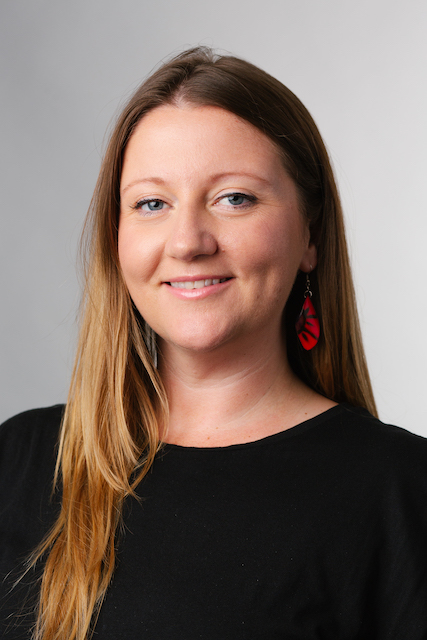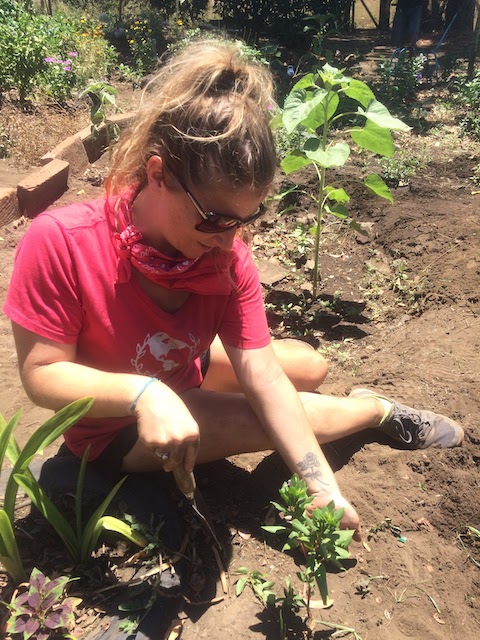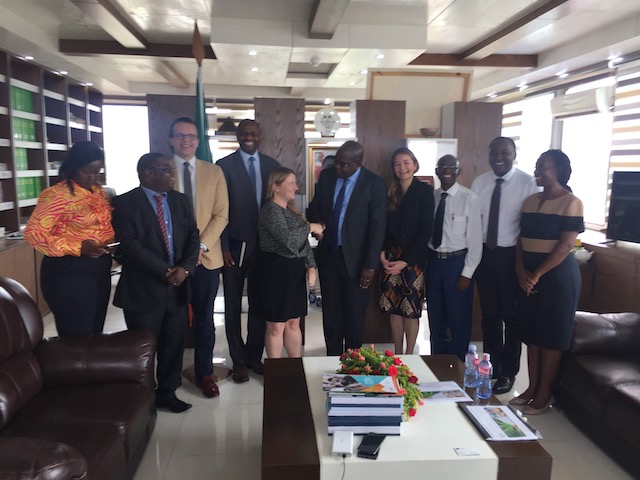From Peru to Malawi (and places between), alumna builds career in global health
It was her love of languages that lead Kelly Carpenter to a career in global health. “I have a degree in Spanish language and literature,” said the Santa Barbara, Calif., native who graduated the USF College of Public Health (COPH) in 2015 with an MPH in global health practice.

“People who study language know that it starts with simple vocabulary and then expands into culture, history, art, literature, politics, etc. Through my Spanish studies, I found myself in different corners of the world. On a trip to Peru, I took a backpack filled with little notebooks and jotted down observations. I didn’t know it at the time, but everything I was observing and reflecting on and engaging in touched on public health. For instance, I spoke with a man who, decades prior, had been bitten by a highly venomous snake; his nearest health post was a two-hour canoe ride downriver. He sought care from the shaman in his community [a person thought to have special healing powers]. One could argue that he might’ve sought the shaman’s care regardless, but certainly this experience solidified his faith in the curative powers of the healer and shaped his healthcare decisions for life.”
Back in the States, Carpenter decided to investigate public health graduate programs.
“Retrospectively, it was more of an academic pursuit—to learn more about the communities of the world—than an intentional career choice,” said Carpenter, who ideally wanted to get a dual master’s degree in public health and anthropology. She said she settled on the COPH because the global health concentration was less clinical in nature than other programs. “The COPH program had the breadth I was looking for,” Carpenter said.
Carpenter was unable to pursue the dual master’s in anthropology and instead focused solely on public health. And today, she’s glad she did.
“Grad school is hard! I had my heart set on doing a dual masters, but I wasn’t accepted [to the anthropology program]. That was a blow, but in the end, it was appropriate,” she said. “I was working multiple jobs, including working in hospitality and taking jobs as an office manager and research assistant. I was also commuting and taking out student loans. A dual master’s was too much. I ended up selecting a certificate option in global health and Latin American and Caribbean Studies, and that was perfect. Where everything about global health was new to me, Latin American and Caribbean Studies felt like home, and it was a perfect complement to my MPH and where I would take it.”
After graduation, Carpenter took jobs in Nicaragua and Guatemala, working in program development and management.
“I worked in asset-based community development with health centers, microfinance organizations, family cooperatives and local NGOs as well as with rural and semi-urban schools and communities in environmental education and youth leadership development,” Carpenter explained.

Beginning her public health career in Nicaragua immediately after graduation was a pivotal move, both personally and professionally.
In 2018, Nicaragua entered an extended socio-political crisis. There were protests and upheaval related to social security reform measures and political corruption.
“I, along with two teammates, were tasked with the close out of our program and operations,” Carpenter said. “It was extremely difficult and disappointing, and we learned a lot. Much of what I learned helped me navigate the unprecedented nature of work and running programs in March 2020 and will hopefully help the next time an inevitable transition comes around.”
Today, Carpenter is senior program manager for country operations at Seed Global Health in Boston. The health nonprofit forms local partnerships to strengthen clinical care delivery, improve health workforce education and support policies that enable health professionals to succeed.
“I work specifically with Malawi and Zambia,” Carpenter noted. “In both countries, Seed has partnered to grow the first family medicine specialist training program. Family physicians and primary care are crucial to strengthening healthcare systems and meeting the needs of dispersed and rural populations, such as those in Malawi and Zambia.”

Carpenter says she is also grateful to have been part of the team supporting partners in Malawi who started the country’s first health ward led by midwives.
“This project provides midwives with an environment where they can practice to the full scope of their training and abilities, helping improve clinical outcomes and preserve the hospital system for those who need it more acutely,” she said.
Carpenter said that what she loves most about working at Seed, and in public health in general, is the breadth of the work and her ability to partner with diverse teams across cultures.
“I love the path I’m on,” she said. “I’m still in a place of learning and growing every day, and I’m excited to see our Seed partnerships continue to blossom. As long as I’m learning, I’m succeeding, and I’m open to where that takes me.”
Alumni Fast Five
What did you dream of becoming when you were young?`
Everything, but photojournalism still haunts.
Where would we find you on the weekend?
Boston is an extremely walkable city—my boyfriend and I love to just leave the house walking and find ourselves in different parts of the city!
What is the last book you read?
“Think Like a Monk,” by Jay Shetty
What superpower would you like to have?
Telepathy. “I wish I could just show you what’s in my brain” is a phrase I utter weekly.
What’s your all-time favorite movie?
“Crash,” and about 15 other season-specific movies that I rewatch every year.
Story by Donna Campisano, USF College of Public Health
